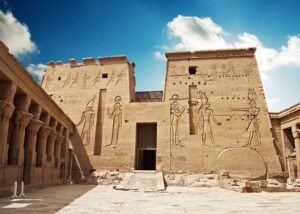Philae Temple Facts
Discovering Philae Temple Facts
Philae Temple Facts 
Philae Temple, located on Agilkia Island near Aswan, Egypt, is one of the most captivating and historically rich sites in the country.
Dedicated to the goddess Isis, this ancient temple complex offers visitors a glimpse into the religious practices, architectural brilliance,
and cultural heritage of ancient Egypt. In this blog post, we will explore some fascinating Philae Temple facts, making it an easy and enjoyable read for all.
Philae Temple Facts >> 1. Historical Significance
Ancient Origins
Philae Temple dates back to the Ptolemaic period (332–30 BCE) and the Roman period (30 BCE–395 CE). Ptolemy II Philadelphus primarily built it,
and later rulers, including the Roman emperors, expanded it.
Religious Importance
The temple was dedicated to Isis, one of the most important deities in ancient Egyptian mythology. Isis was revered as the goddess of magic, motherhood, and fertility.
The temple complex also honored other deities, including Osiris (Isis's husband) and Horus (their son).
Philae Temple Facts >> 2. Relocation and Preservation
Threat of Submersion
The original location of Philae Temple was on Philae Island. However, the construction of the Aswan Low Dam in 1902 and the subsequent Aswan High Dam
in the 1960s threatened to submerge the temple under the rising waters of the Nile.
UNESCO Rescue Mission
In a monumental effort to save the temple, UNESCO launched an international campaign in the 1960s. The entire temple complex was meticulously dismantled
and relocated to the nearby Agilkia Island, where it was reassembled stone by stone. This remarkable feat of engineering ensured the preservation of
Philae Temple for future generations.
Philae Temple Facts >> 3. Architectural Marvels
Hypostyle Hall
One of the most impressive features of Philae Temple is the Hypostyle Hall. This grand hall, supported by towering columns adorned with intricate carvings,
served as a gathering place for worshippers. The columns are decorated with scenes depicting the gods and the pharaohs, showcasing the artistic prowess of
ancient Egyptian craftsmen.
Inner Sanctuaries
The temple complex includes several inner sanctuaries dedicated to various deities. The Sanctuary of Isis, located at the heart of the temple, was the most sacred area.
It housed the statue of Isis and was the focal point of religious ceremonies and rituals.
Philae Temple Facts >> 4. Mythological Tales
The Legend of Isis and Osiris
Philae Temple is steeped in mythological tales, particularly the story of Isis and Osiris. According to legend, Osiris was murdered by his brother Set,
who scattered his body parts across Egypt. Isis, with her magical powers, collected the pieces and resurrected Osiris, allowing him to become the god of the afterlife.
This tale of death and resurrection was central to the religious beliefs of ancient Egyptians and was celebrated through rituals at Philae Temple.
The Birth of Horus
Another significant myth associated with Philae Temple is the birth of Horus. After resurrecting Osiris, Isis gave birth to Horus, who later avenged his father's death by defeating Set.
Horus was worshipped as the god of kingship and protection, and his story was prominently featured in the temple's reliefs and inscriptions.
Philae Temple Facts >> 5. Cultural and Social Hub
Pilgrimage Site
Philae Temple was a major pilgrimage site for ancient Egyptians and people from neighboring regions. Pilgrims would travel long distances to seek blessings from Isis and
participate in religious festivals. The temple's strategic location on the Nile made it accessible to devotees arriving by boat.
Community Gatherings
The temple complex also served as a social and cultural hub for the local community. It was a place where people gathered for festivals,
ceremonies, and communal activities. The annual "Feast of the Beautiful Meeting," celebrating the reunion of Isis and Osiris, was one of the most important events held at Philae.
Philae Temple Facts >> 6. Modern-Day Attractions
Sound and Light Show
One of the highlights of visiting Philae Temple today is the mesmerizing Sound and Light Show. This evening spectacle uses cutting-edge technology to illuminate
the temple's structures while narrating the history and legends associated with the site. The show offers a captivating experience that brings the ancient world to life.
Scenic Boat Rides
To reach Philae Temple, visitors must take a short boat ride from the mainland. The journey offers stunning views of the Nile and the surrounding landscape,
setting the stage for the awe-inspiring beauty of the temple complex. The boat ride itself is a memorable part of the Philae experience.
Philae Temple Facts >> 7. Practical Tips for Visiting
Best Time to Visit
The best time to visit Philae Temple is during the cooler months from October to April. The weather is more pleasant, making it easier to explore the site comfortably.
Early morning or late afternoon visits are also recommended to avoid the midday heat.
Guided Tours
To fully appreciate the history and significance of Philae Temple, consider joining a guided tour. Knowledgeable guides can provide valuable insights into the temple's architecture, mythology, and cultural context, enhancing your overall experience.
Respectful Conduct
As a site of immense historical and cultural importance, it is essential to show respect while visiting Philae Temple. Follow the guidelines provided by the authorities,
avoid touching the ancient structures, and maintain a respectful demeanor throughout your visit.
Conclusion
Philae Temple is a testament to the enduring legacy of ancient Egyptian civilization. Its rich history, architectural brilliance, and mythological
significance make it one of the most captivating sites in Egypt. Whether you are a history enthusiast, a mythology buff, or simply seeking a unique
cultural experience, a visit to Philae Temple promises to be an unforgettable journey through time. Explore the wonders of this ancient sanctuary
and immerse yourself in the timeless stories that continue to inspire and captivate visitors from around the world. These Philae Temple facts
highlight the temple's significance and ensure that its legacy endures for generations to come.
Comments
Post a Comment